- News
- Reviews
- Bikes
- Accessories
- Accessories - misc
- Computer mounts
- Bags
- Bar ends
- Bike bags & cases
- Bottle cages
- Bottles
- Cameras
- Car racks
- Child seats
- Computers
- Glasses
- GPS units
- Helmets
- Lights - front
- Lights - rear
- Lights - sets
- Locks
- Mirrors
- Mudguards
- Racks
- Pumps & CO2 inflators
- Puncture kits
- Reflectives
- Smart watches
- Stands and racks
- Trailers
- Clothing
- Components
- Bar tape & grips
- Bottom brackets
- Brake & gear cables
- Brake & STI levers
- Brake pads & spares
- Brakes
- Cassettes & freewheels
- Chains
- Chainsets & chainrings
- Derailleurs - front
- Derailleurs - rear
- Forks
- Gear levers & shifters
- Groupsets
- Handlebars & extensions
- Headsets
- Hubs
- Inner tubes
- Pedals
- Quick releases & skewers
- Saddles
- Seatposts
- Stems
- Wheels
- Tyres
- Health, fitness and nutrition
- Tools and workshop
- Miscellaneous
- Tubeless valves
- Buyers Guides
- Features
- Forum
- Recommends
- Podcast
news
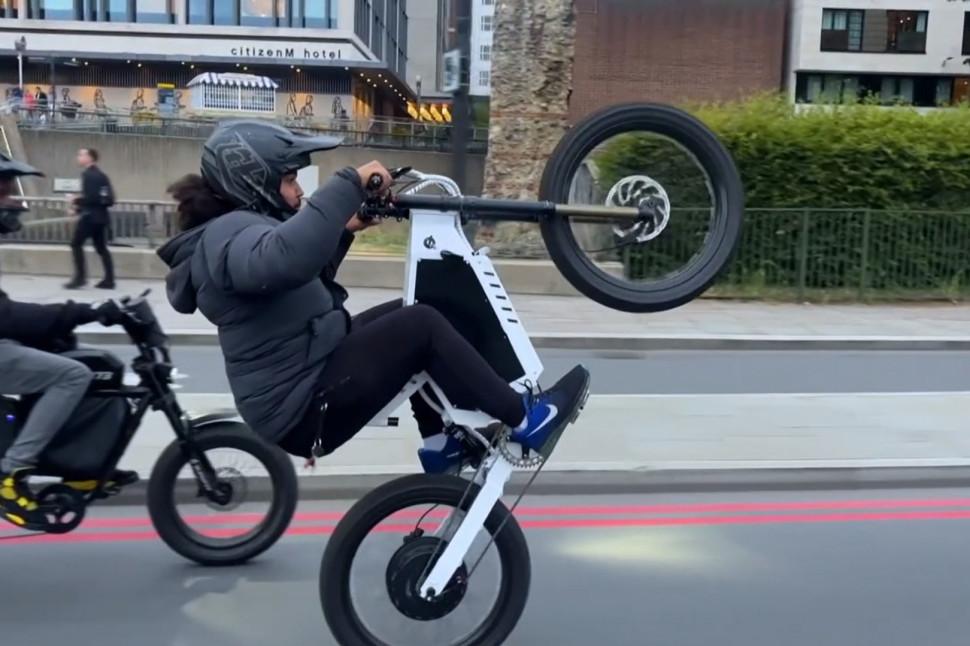 BBC e-bike Panorama - wheelie
BBC e-bike Panorama - wheelie“E-bikes are not illegal”: BBC hit with more complaints about “misleading and damaging” Panorama e-bike episode, as cycle shop owner says: “Finding a wolf in sheep’s clothing should not be a reason to attack sheep”
Almost two weeks since the BBC aired its controversial, Adrian Chiles-fronted Panorama episode on e-bikes, the complaints keep flooding into the broadcaster, after the owner of an e-bike shop branded the programme “troubling” and “misleading”, with the potential to “unfairly influence public opinion and undermine the efforts of responsible retailers who prioritise safety, respectful riding, and adherence to the law”.
A formal complaint lodged to the BBC this week by Ray Wookey, the owner of Energise E-Bikes in the south London town of Coulsdon, claimed the programme offered a “negative portrayal” of electric bikes by showing “very few legitimate e-bikes shown on-screen” – instead focusing on illegally modified or unregistered ‘e-motorbikes’.
Wookey argued that the use of the phrase “illegal e-bikes” is “misleading and damaging”, and has the effect of cementing in the public’s mind that all e-bikes are illegal, and that the general “imbalance” evident in the episode has the potential to “hurt trustworthy electric bike businesses”.
He also noted that while focusing on road safety issues – such as the relationship between e-bike riders and pedestrians – is important, it “should not involve the misrepresentation of an important and fast-growing sector” capable of promoting a safe, healthy, and environmentally-friendly form of transport.
Last week, the BBC found itself on the receiving end of a furious backlash from cycling groups after it aired the Panorama episode, ‘E-Bikes: The Battle For Our Streets’, hosted by Adrian Chiles, which saw the former One Show host ask whether electric bikes are “a new menace in need of tighter regulation”.
The episode’s prolonged focus on modified e-bikes – which exceed the maximum 250 watts and 15.5mph cut-off speed for electrically assisted pedal cycles (EAPCs) permitted under UK law to ride on public roads – and the failure to consistently and fully distinguish between these machines proved controversial, however, provoking some strong criticism from cycling campaigners and bike industry groups.
“Panorama confuses legal with illegally modified e-bikes and ignores their benefits compared to the UK’s car use,” the London Cycling Campaign said in response to the episode, which many cyclists criticised for its conflation of the criminality, dangerous riding, and battery fires associated with illegally modified two-wheeled electric vehicles with legal e-bikes.
“If we switched lots of cars for e-bikes in the UK we’d see health, crime, road danger, and climate benefits, not the tabloid, crime-ridden, apocalyptic vision Panorama paints,” the group said.
Referring to the programme’s attempt to discover whether e-bike use is linked to dangerous riding and criminality, Alex Bowden, in his review for road.cc’s sister site e-biketips, said: “Clearly there are specific issues which nebulous questioning and imprecise categorisation won’t do much to resolve.
“Maybe we’re biased but ‘What can we do about e-bikes?’ and ‘What can we do about illegal e-bikes?’ are not to us the same question.”
Meanwhile, the Bicycle Association (BA), the trade organisation representing 140 cycling companies in the UK, and the Association of Cycle Traders both lodged formal complaints with the BBC concerning Panorama’s coverage of e-bikes.
The Bicycle Association’s technical and policy director Peter Eland called on the BBC to “remove ‘E-bikes’ from the episode title and instead reference what the group terms ‘illegal e-motorbikes’,” and in future programming on the subject to “make it fully clear and properly inform the public that e-bikes and illegal e-motorbikes are two entirely separate categories”.
He also urged the broadcaster more generally to “provide proper balance when addressing contentious transport issues, including featuring representation by responsible organisations in the sector”.
According to the association, the Panorama episode “repeatedly conflates the safety and social issues surrounding the use of illegal e-motorbikes with ‘e-bikes’ and fails to make it clear that these issues are overwhelmingly not caused by (road legal) e-bikes.”
This “misrepresentation”, the BA claimed, failed to properly inform the public of the current laws on e-bikes in the UK and has “unjustifiably damaged” the electric bike sector.
Jonathan Harrison, the director of the Association for Cycle Traders, also criticised the “division” the episode “tried to sow” and asked: “Does the hysteria match the actual harm caused?”
And now, independent bike shop owners are adding their voice to the industry’s chorus of disapproval, as Energise founder Ray Wookey lodged his own formal complaint and called on the BBC to “provide a more balance perspective” on the safety issues surrounding e-bikes in the future.
“While the programme intended to raise awareness about safety issues, I found the lack of representation from reputable and legitimate e-bike retailers troubling and potentially misleading,” the Croydon-based retailer, who has sold e-bikes to the Metropolitan Police during his 15 years in business, said in the complaint, titled ‘E-bikes are not illegal’.
“Naturally, the safety of road users is the most important thing, but highlighting danger should not involve the misrepresentation of an important and fast-growing sector.
“Up and down the UK, there are reputable retailers of electric bikes, many of which are independent, locally owned small businesses. Each of these establishments helps to increase the amount of healthy, eco-friendly travel in their communities through the sale of safe and legal products.
“By not including interviews with credible e-bike retailers or industry experts – and instead speaking to a so-called ‘e-bike collector’ – the programme failed to present balanced information. Such imbalance can unfairly influence public opinion and undermine the efforts of responsible retailers who prioritise safety, respectful riding, and adherence to the law.”
The complaint continued: “The negative portrayal of e-bikes without input from legitimate retailers may harm the industry, potentially affecting small businesses and employees reliant on this growing market.
“You may also like to consider that the majority of two-wheeled vehicles featured in the episode were in fact not e-bikes at all, but ‘unregistered e-motorbikes’ which have been mis-labelled as ‘e-bikes’, firstly by unscrupulous retailers and secondly by the programme itself.
“There were very few legitimate e-bikes shown on-screen, which again is an imbalance that will hurt trustworthy electric bike businesses.
“Repeated use of the phrase ‘illegal e-bikes’ is misleading and damaging. Using this phrasing, or similar, could persuade members of the public that all e-bikes are illegal, when in fact the problem is ‘unregistered e-mopeds’.
“Finding a wolf in sheep’s clothing should not be a reason to attack sheep. Call a wolf, a wolf, and call an unregistered e-motorbikes, an unregistered e-motorbikes.
“I kindly request that you consider these points and take steps to address the imbalance in future reporting. Providing a more balanced perspective, including input from reputable e-bike retailers, and using accurate language, will ensure a fair and informative presentation of the topic.”
After obtaining a PhD, lecturing, and hosting a history podcast at Queen’s University Belfast, Ryan joined road.cc in December 2021 and since then has kept the site’s readers and listeners informed and enthralled (well at least occasionally) on news, the live blog, and the road.cc Podcast. After boarding a wrong bus at the world championships and ruining a good pair of jeans at the cyclocross, he now serves as road.cc’s senior news writer. Before his foray into cycling journalism, he wallowed in the equally pitiless world of academia, where he wrote a book about Victorian politics and droned on about cycling and bikes to classes of bored students (while taking every chance he could get to talk about cycling in print or on the radio). He can be found riding his bike very slowly around the narrow, scenic country lanes of Co. Down.
Latest Comments
- HoarseMann 1 hour 30 min ago
I downloaded a sound clip of a bus engine idling and play it on loop via a bluetooth speaker on the handlebars - works a treat with pedestrians on...
- brooksby 1 hour 41 min ago
OK, didn't know that <shrug>
- Spangly Shiny 2 hours 22 min ago
Army Air Tech (A&E) helicopters here, again through the 70's 80's & 90's 'till they found out I was an old knacker and biffed me out to...
- don simon fbpe 2 hours 28 min ago
Which one rides better on astroturf?
- chrisonabike 2 hours 52 min ago
(The Post didn't seem to have all the pics - they are available on the council's news site here)....
- KDee 3 hours 31 min ago
I'm more interested in the Sonder with a "97mm" wheelbase...might have some toe overlap 😂
- chrisonabike 3 hours 36 min ago
Possibly some marketeers for whom "getting attention" is the only good, likely company director(s) who also see "no such thing as bad publicity"?...
- ErnieC 4 hours 5 min ago
Agreed. Use Evo Zero and the transition is pretty quick.
- wtjs 4 hours 10 min ago
Obviously a Lancashire Constabulary outstation, where they train the police up for getting all reports into the bin as quickly as possible...
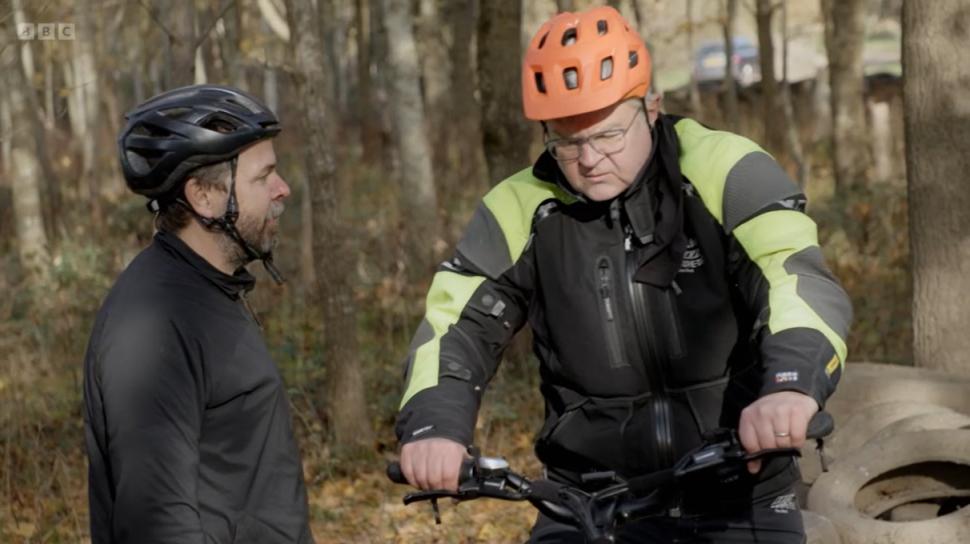
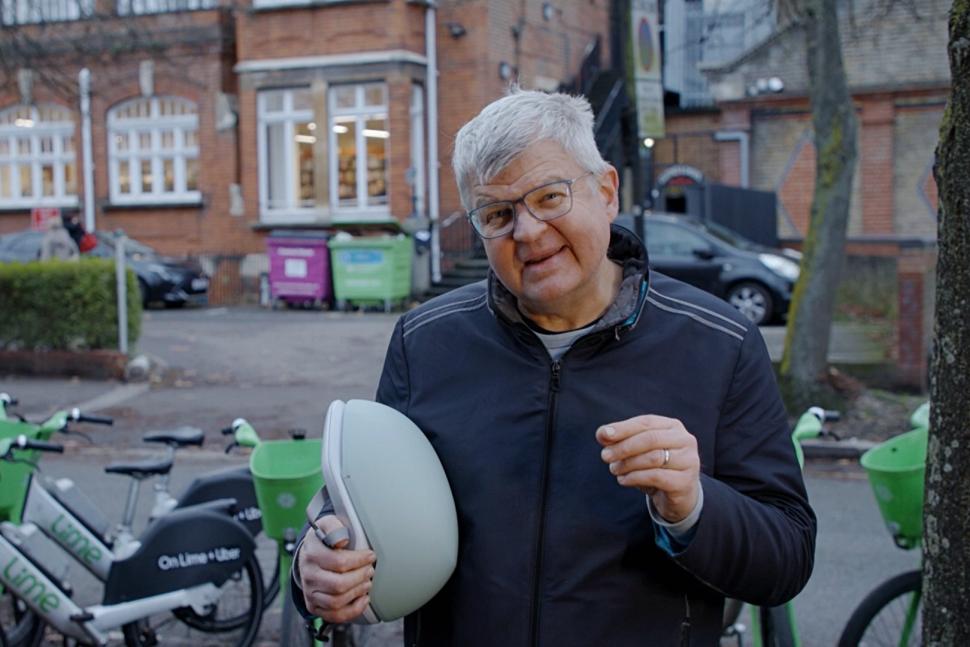
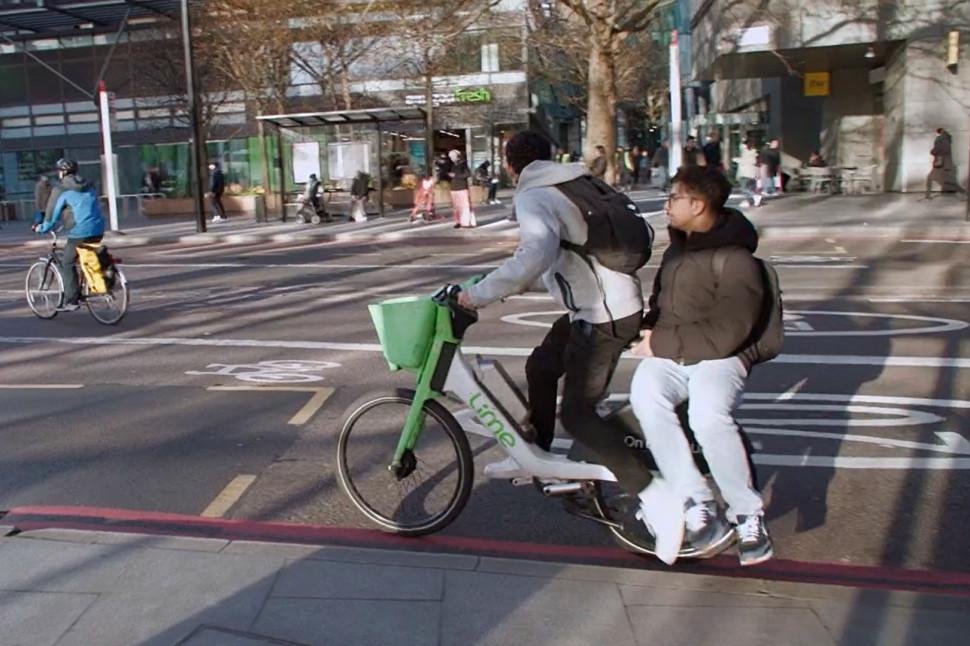
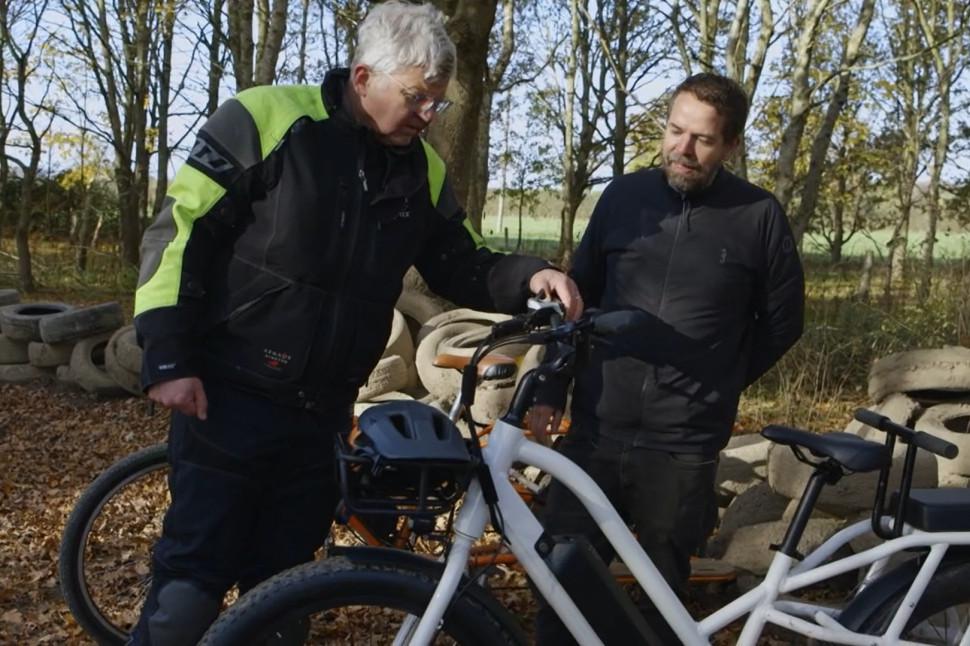
Add new comment
37 comments
An extraordinary point to make in an investigative journalism programme - imagine if they did that for a Panorama programme on, say, massive banking fraud. "Well, we spoke to the bloke in the bank who said it was all totally legit, so that's fine then".
Thanks - that's interesting. A totally rubbish reply from the BBC, but interesting.
From the response:
"Throughout the programme, contributors outlined both positive and negative aspects of e-bikes." Probably over 90% negative.
"Viewers will have heard that e-bikes (in their various forms) are beneficial for the environment, convenient for users and often fun to ride." Not from the BBC they wouldn't.
"This is not misrepresentation or inaccuracy, and we therefore felt it was justified to use a range of footage of different e-bikes both road legal and illegal throughout the film." Oh yes it was misrepresentation, especially when the BBC has never (AFAIK) had any programmes about how great ebikes are. The illegal bikes predominated by a large margin.
"We believe that all of our interviewees were appropriate and sufficiently well informed." You've got to be kidding me! Nobody from CUK or BA.
"This programme was not an attack on the e-bike industry or e-biking in general and we were not obliged to interview someone from the industry in order to achieve “fair balance.”" It most certainly was an attack on ebikes, and it could only be described as not an attack if the BBC had had lots of other programmes promoting ebikes. No? Case proven. The "fair balance" thing is just hilarious.
"We think the programme featured lots of positive comments about e-bikes." I didn't count them, but I don't think I'd have needed all the fingers on one hand.
"There is widespread confusion about e-bikes." Which that programme made worse.
And finally:
"Thank you for taking the time to write to us and we hope that this addresses the issues you have raised."

Loved this one
"There is also confusion about the use of throttles. The law says that they should not be used for greater assistance than 6 kph but it is possible to get an e-bike reclassified via the DVSA as an e-moped and then use a throttle when not pedalling. This presents difficulty for police and councils who have to work out which e-bikes have been reclassified as e-mopeds. "
There would be no confusion for the Police as the legally reclassified e-moped would have to have a large bright yellow number plate at the rear. Who do the BBC employ to do basic fact checks these days?
"To the public and to all intents and purposes, e-bikes and those bikes that do not conform to EAPC regulations are indistinguishable; two-wheeled vehicles with an electric battery-powered motor and having the same or similar physical appearance to bicycle. The former is governed by restrictions which we detail in the programme. This is how the average, reasonable viewer and person understands them."
So, in the BBC spirit of "Inform, educate and entertain," this edition of Panorama decided to forego the inform and educate bits to concentrate on entertaining the anti-cycle lobby.
Interesting that the BBC's reply (which rather misses the point of the complaint) features the following quote: "The programme featured footage of an accident where a Lime bike rider knocked over a young child, for example." I wonder if one of the many, daily, examples of a driver knocking someone over will be enough to trigger a similarly critical car - focused episode of Panorama?
Wasn't that the incident where the kid runs for the bus, across a segregated cycle path and apparently without looking, and knocks someone off their lime bike?
Pages